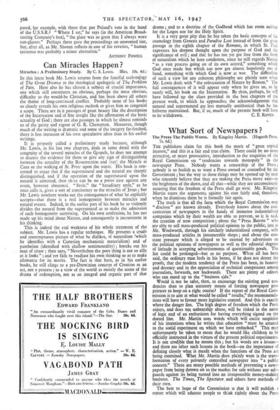Can Miracles Happen ?
IN this latest book Mr. Lewis returns from the fanciful eschatology of The Great Divorce to the theological apologetic of The Problem of Pain. Here also he has chosen a subject of crucial importance, one which still constitutes an obvious, perhaps the most obvious, difficulty to the would-be Christian, and has been above all others the theme of long-continued conflict. Probably none of his books so clearly reveals his own religious outlook or gives him so congenial a scope. There are in it passages of great beauty like the description of the Incarnation and of fine insight like the affirmation of the basic actuality of God ; there are also passages in which he almost reminds us of the gaiety and vigour of G. K. Chesterton. Moreover, though much of the writing is dramatic and some of the imagery far-fetched, there is less intrusion of his own speculative ideas than in his earlier writings. It is properly called a preliminary study because, although Mr. Lewis, in his last two chapters, deals in some detail with the congruity of the several miracles of the gospels, he does not attempt to discuss the evidence for them or give any sign of distinguishing between the .actuality of the Resurrection and (say) the Miracle at Cana or the walking of St. Peter upon the water. His book is con- cerned to argue that if the supernatural and the natural are sharply distinguished, and if the operation of the supernatural upon the natural is admitted, then there can be no a priori case against any event, however abnormal. " Style," the " hereditary style," as he once calls it, gives a sort of consistency to the miracles of Jesus ; but Mr. Lewis nowhere works out the consequences of what he explicitly accepts—that there is a real homogeneity between miracles and natural events. Indeed, in the earlier part of his book he so violently divides the natural from the supernatural as to make the admission of such homogeneity surprising. On his own confession, he has not made up his mind about Nature, and consequently is inconsistent in his thinking. This is indeed the real weakness of his whole treatment of the subject. Mr. Lewis has a regular technique. He presents a crude and contemptuous picture of what he dislikes, of naturalism (which he identifies with a Cartesian mechanistic materialism) and of pantheism (identified with shallow sentimentality) ; knocks out his man of straw ; then says, "Nevertheless the poor thing is not so silly as it looks " ; and yet fails to readjust his own thinking so as to make allowance for its merits. The fact is that here, as in his earlier books, he still clings to a pre-Darwinian concept of Creation as an act, not a process ; to a view of the world as merely the scene of the drama of redemption, not as an integral and organic part of that
drama ; and to a doctrine of the Godhead which has room neither for the Logos nor for the Holy Spirit.
It is a very great pity that he has taken the basic concepts of his cosmology from Genesis and Paradise Lost instead of from the great passage in the eighth chapter of the Romans, in which St. Paul expresses his deepest thought upon the purpose of God and the significance of evil ; and that he has not yet got free from the form of naturalism which he here condemns, since he still regards Nature " as a vast process going on of its own accord," something which God once made but which has now got almost hopelessly out of hand, something with which God is now at war. The difficulties of such a view for any coherent philosophy are plainly seen when Mr. Lewis deals with " the colonisation of Nature by Reason." The full consequences of it will appear only when he gives us, as he surely will, his book on the Incarnation. By then, perhaps, he will have followed up the clues provided in the best chapters of the present work, in which he approaches the acknowledgement that natural and supernatural are less mutually antithetical than he has hitherto maintained. But,-if so, much of the present book will have


































 Previous page
Previous page